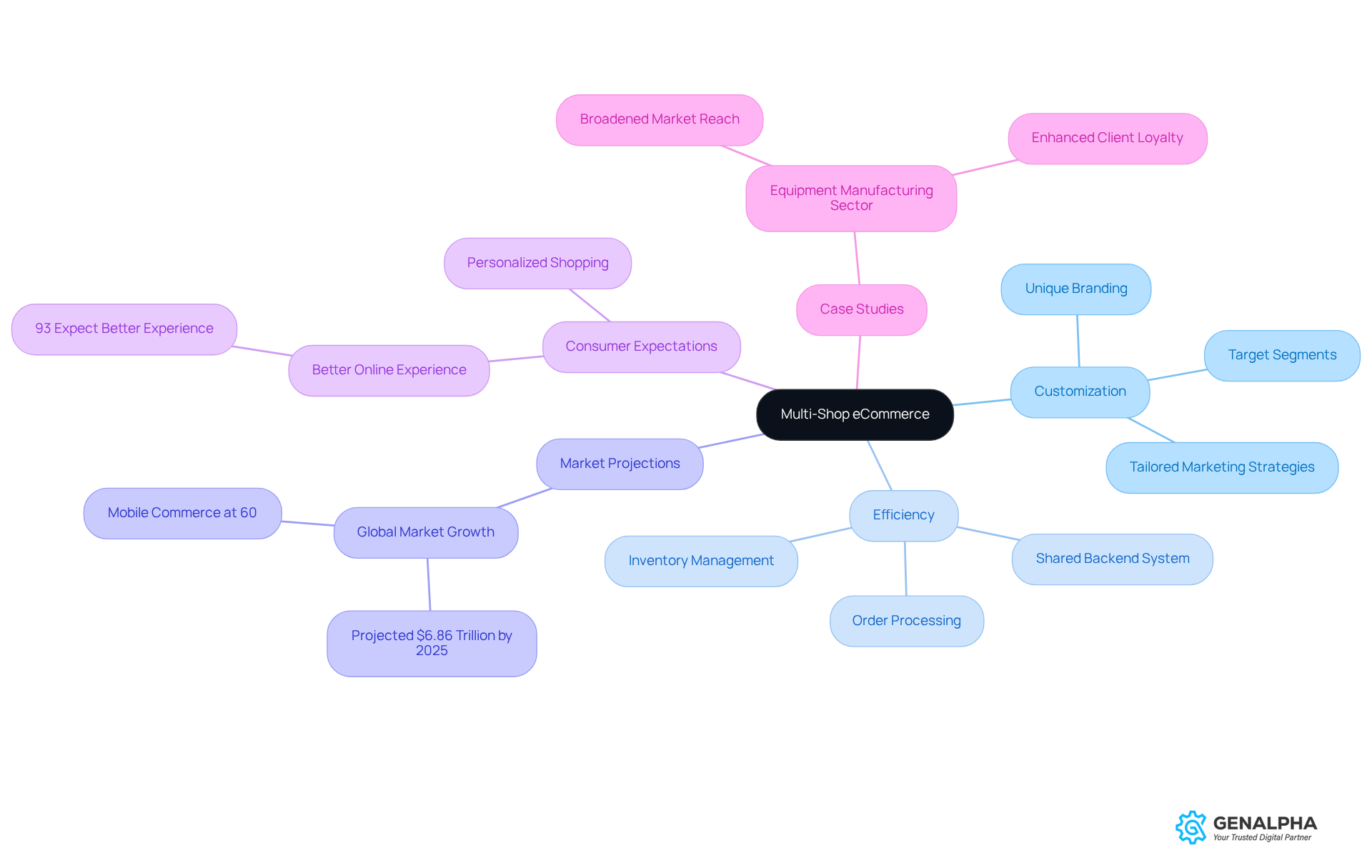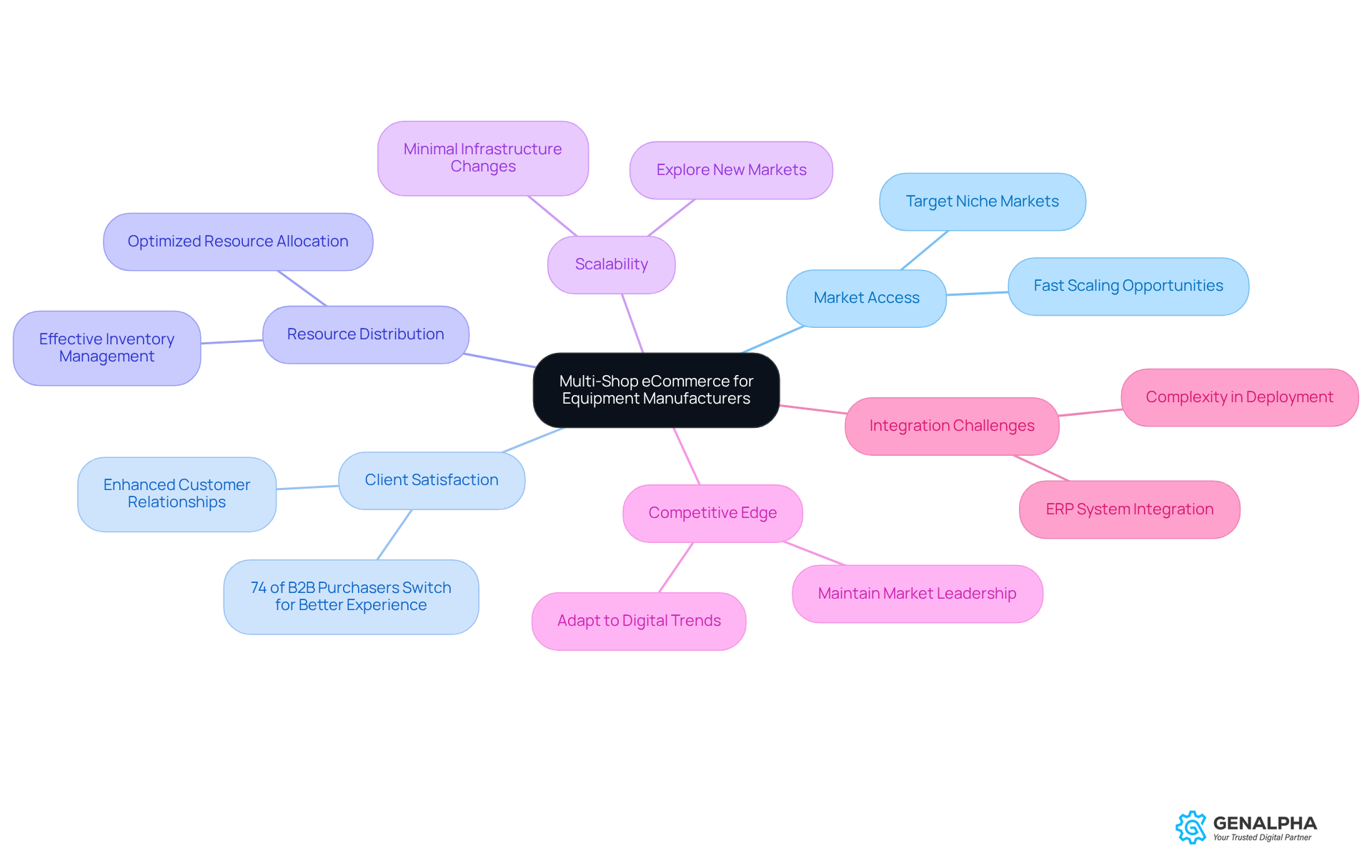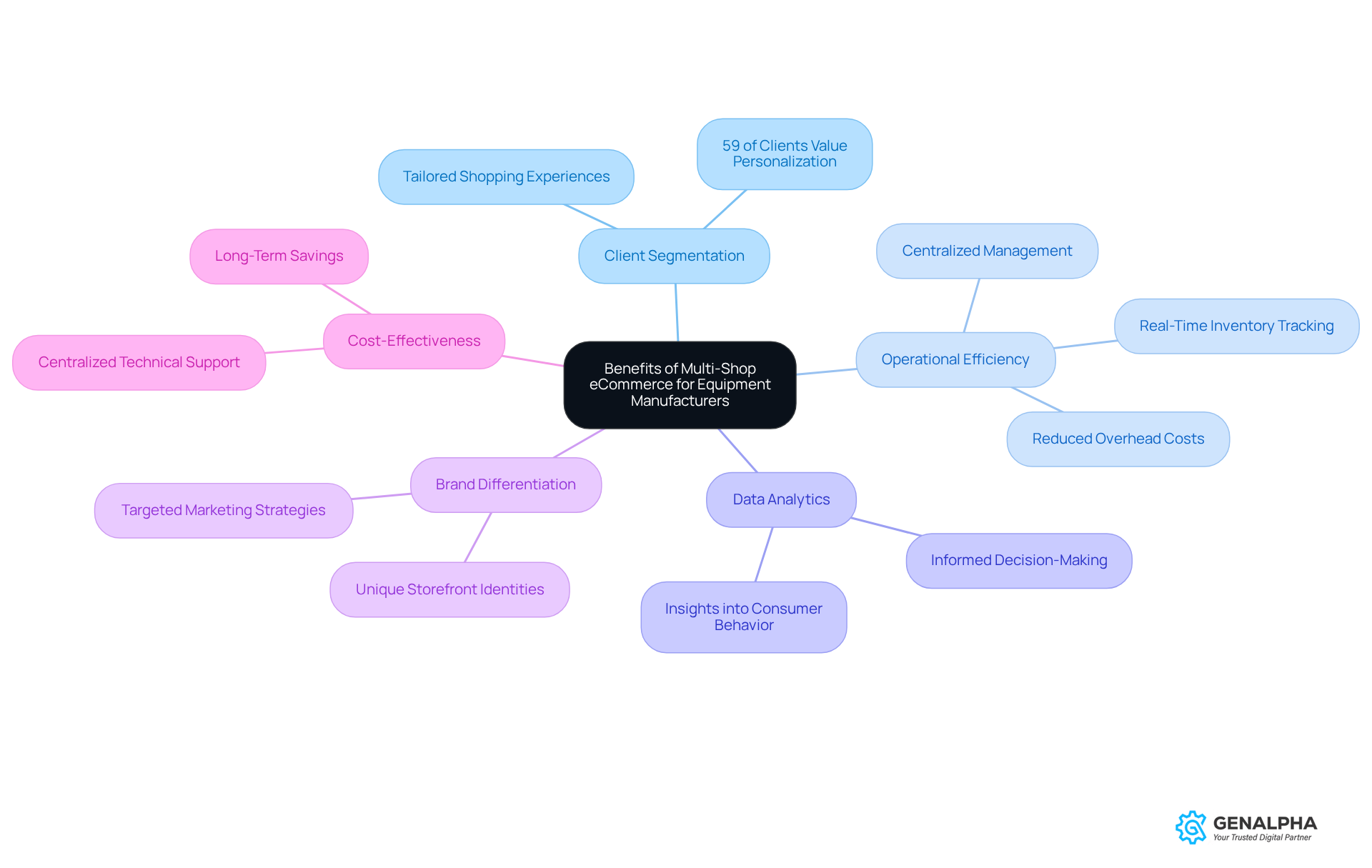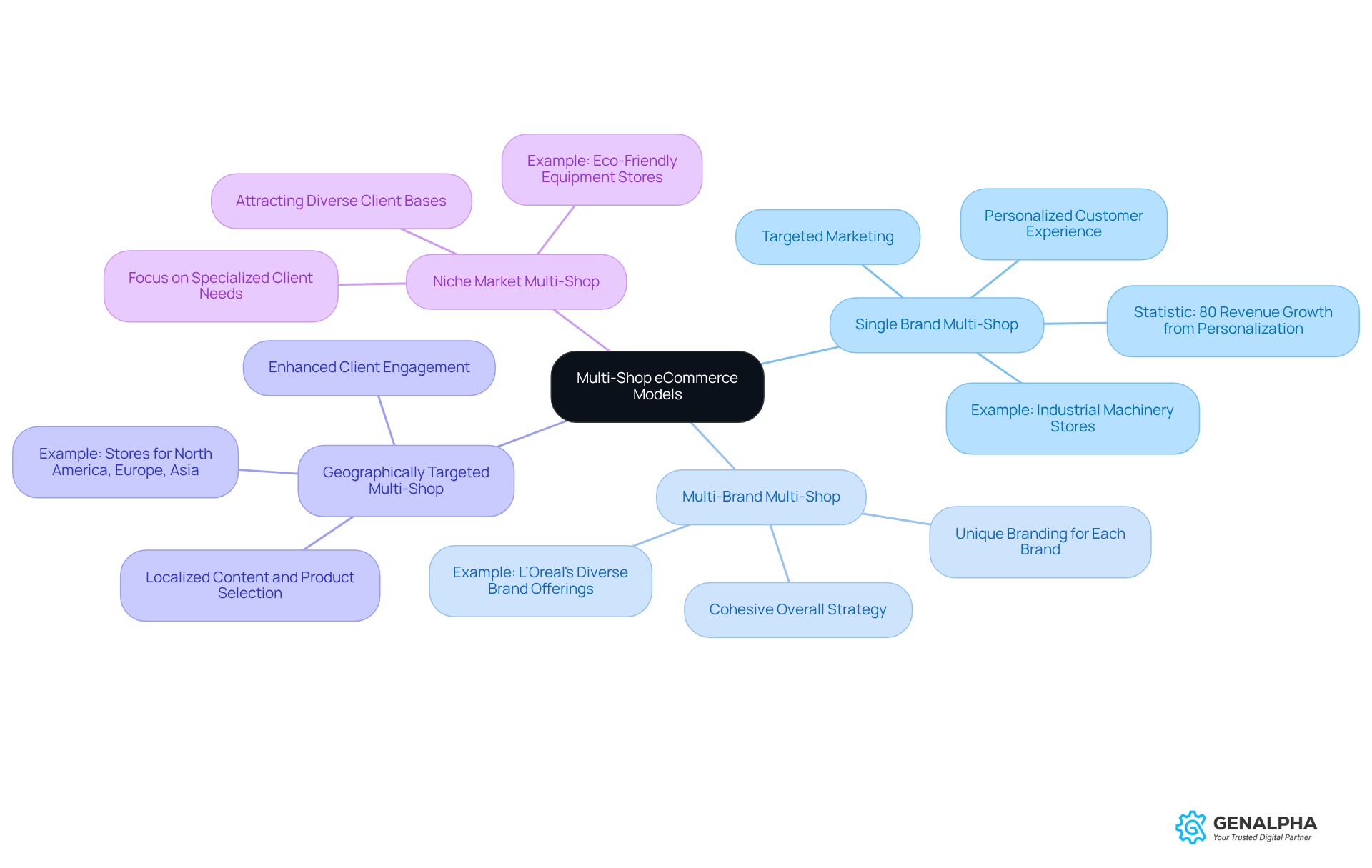Overview
Have you ever thought about how multi-shop eCommerce could be a game-changer for equipment manufacturers? Imagine being able to manage multiple online storefronts, each one tailored to specific markets or products. Sounds pretty cool, right? This approach not only helps in managing diverse offerings but also brings along a bunch of advantages!
First off, think about improved client segmentation. By having unique storefronts, manufacturers can better target their audience, ensuring that the right products reach the right customers. Additionally, this setup boosts operational efficiency, allowing businesses to streamline processes and save time. And let’s not forget about enhanced brand differentiation—standing out in a crowded market is crucial, and multi-shop eCommerce gives manufacturers the tools to do just that.
So, what does this mean for you? By embracing these strategies, manufacturers can meet diverse customer needs more effectively and drive sales growth. It’s all about making those connections and responding to what customers really want. Ready to explore how this could work for you? Let’s dive in!
Introduction
Did you know that the online retail market is set to skyrocket to an incredible $6.86 trillion by 2025? This rapid growth really highlights how crucial it is for equipment manufacturers to step up their digital game. One exciting way to do this is through multi-shop eCommerce, which allows businesses to manage several customized storefronts all from one platform. This not only boosts customer engagement but also streamlines operations.
However, as manufacturers dive into this promising path, they face some real challenges. Implementing these systems can get complicated, and reaching out to different client segments effectively is no small feat. So, what opportunities and hurdles might we encounter in this ever-changing world of digital commerce? Let's explore together!
Defining Multi-Shop eCommerce
The multi shop ecommerce model is an innovative digital commerce approach that enables a single business to oversee multiple online storefronts from one platform. Imagine being able to tailor each storefront to cater to different client segments, product lines, or geographical markets! You can use a for inventory management, order processing, and client data, making it super efficient.
This model really empowers producers to customize their offerings and marketing strategies for specific audiences. Think about it: a producer could have separate shops for construction equipment and agricultural machinery, each with its own unique branding and user experience that truly resonates with their respective customer bases.
Now, here's something to grab your attention: projections show that the global online retail market is expected to hit a whopping $6.86 trillion by 2025! This highlights just how crucial digital commerce strategies like multi shop ecommerce are becoming. Plus, mobile commerce is anticipated to make up 60% of global online sales, which means manufacturers need to seriously boost their digital presence across various storefronts.
Industry experts are saying that companies using multi-shop online retail are seeing some impressive improvements in client interaction. For example, a study found that 93% of online shoppers expect a better shopping experience online compared to brick-and-mortar stores. This suggests that personalized online experiences can lead to happier consumers.
Analyzing case studies from the equipment manufacturing sector, we observe that firms utilizing multi shop ecommerce have effectively broadened their market reach and enhanced client loyalty. By offering specialized storefronts, these producers can meet the unique needs of different client groups, ultimately driving sales and enhancing brand loyalty. So, why not explore the potential benefits of multi shop ecommerce for you?

Importance of Multi-Shop eCommerce for Equipment Manufacturers
For equipment producers, embracing a multi shop ecommerce approach is essential for expanding market access and boosting client satisfaction. Imagine managing a multi shop ecommerce system with multiple storefronts that allow you to effectively target niche markets—this means you can create tailored marketing strategies that truly resonate with your customers' unique needs.
This model not only but also empowers producers to distribute resources more effectively across various product lines. Plus, it opens the door for scalability, enabling producers to explore new markets or areas without the hassle of significant infrastructure changes. As a result, manufacturers can keep their competitive edge in an increasingly digital marketplace.
Research shows that companies using multi-location strategies see remarkable improvements in client satisfaction and engagement. In fact, 74% of B2B purchasers say they would switch vendors for a better online experience! Additionally, expert insights indicate that this approach boosts operational efficiency and strengthens customer relationships. Industry leaders like Tony Hsieh emphasize the importance of a holistic approach to customer service.
Ultimately, this strategy paves the way for growth in a competitive landscape. However, it's important for producers to remain aware of the complexities involved in deploying such systems. For instance, integrating with existing ERP solutions is crucial to enhancing operations. So, are you ready to take your eCommerce game to the next level?

Benefits of Multi-Shop eCommerce for Equipment Manufacturers
Multi shop ecommerce offers some fantastic benefits for equipment producers. One major perk is improved client segmentation. This means manufacturers can tailor shopping experiences to fit the unique preferences of different consumer groups. Did you know that 59% of clients consider personalized engagement based on past interactions to be super important? This really highlights how valuable personalization is in building deeper connections and loyalty with clients. Companies that embrace advanced segmentation strategies often see a noticeable boost in customer retention and satisfaction.
Another big advantage is operational efficiency. The management tasks like inventory control and order fulfillment are centralized through multi shop ecommerce. This consolidation not only simplifies processes but also cuts down on overhead costs, allowing producers to use their resources more effectively. For instance, a multi-store management system lets businesses track inventory in real-time across various stores. This is crucial for avoiding those pesky overstock or stockout situations.
Data analytics also play a vital role in this model. They provide insights into consumer behavior and sales trends across multiple stores. With these insights, manufacturers can make informed decisions that drive growth. Plus, the multi-shop model supports brand differentiation. Manufacturers can craft unique identities for each storefront, boosting brand loyalty and recognition among diverse customer bases. This strategy allows for that really resonates with specific demographics, ultimately leading to increased sales and a stronger market presence.
By taking advantage of these benefits, equipment producers can strategically position themselves in the ever-evolving landscape of multi shop ecommerce. And let’s not forget about cost-effectiveness! Over time, multi-store solutions can really pay off, as they centralize management and reduce the need for multiple hosting and technical support for individual stores. So, why not consider making the switch?

Types of Multi-Shop eCommerce Models
By embracing different multi-shop eCommerce models, equipment producers can significantly enhance their online presence and meet various client needs. Let’s break down a few of them:
- Single Brand Multi-Shop: Imagine one brand running several storefronts, each designed for specific market segments or product categories. For instance, a manufacturer of industrial machinery might set up separate shops for construction, agriculture, and forestry equipment. This allows for targeted marketing and a personalized customer experience. Did you know that 80% of eCommerce companies reported revenue growth after implementing personalization? That really highlights how effective this model can be!
- Multi-Brand Multi-Shop: Now, picture a company managing multiple brands under one roof. This approach lets each brand have its own unique branding and marketing strategies, which is especially handy for producers that have expanded through acquisitions. They can maintain the distinct identities of each brand while still presenting a cohesive overall strategy. A great example is L’Oreal, which effectively targets different market segments with its diverse brand offerings.
- Geographically Targeted Multi-Shop: This strategy is all about creating storefronts that cater to specific geographical areas, taking into account local preferences and regulations. For example, a producer could have separate stores for North America, Europe, and Asia, each featuring tailored content and product selections that resonate with local clients. This can really enhance client engagement and satisfaction.
- Niche Market Multi-Shop: Lastly, we have the niche market model, which focuses on specific niches within the broader market. This enables producers to meet specialized client needs. For instance, a producer might launch distinct stores for eco-friendly equipment or advanced technology machinery, attracting various client bases and boosting engagement. The rise of direct-to-consumer (DTC) models has made it easier to launch and manage multiple brands, allowing for better data collection and quicker issue resolution.
Understanding these models helps producers select the framework that aligns best with their . By implementing effective strategies in multi shop ecommerce, manufacturers can enhance brand visibility and customer trust, ultimately driving sales growth. However, it’s crucial to acknowledge the challenges of multi-site implementation, such as managing complex product data and developing a master inventory database, which are key for successful operations across different shops. So, which model resonates with you the most?

Conclusion
The multi-shop eCommerce model is truly a game changer for equipment manufacturers. It allows them to manage multiple online storefronts effortlessly, tailoring their offerings and marketing to different customer segments. This not only enhances user experience but also drives sales. As the online retail landscape keeps growing, adopting this model is becoming crucial for manufacturers who want to stay ahead of the competition.
Throughout our discussion, we've uncovered some key insights about the perks of multi-shop eCommerce. Think about improved client segmentation and operational efficiency, plus the ability to use data analytics for smarter decision-making. The benefits are significant! By exploring different multi-shop models—whether it’s a single brand, multi-brand, geographically targeted, or niche market—manufacturers can meet diverse client needs while optimizing their resources.
In today’s fast-paced digital marketplace, embracing multi-shop eCommerce isn’t just a choice; it’s a must for equipment manufacturers who are aiming for growth and customer satisfaction. By diving into the potential of this model, businesses can not only broaden their market reach but also build deeper connections with their customers. So, why wait? Consider how multi-shop eCommerce can elevate your business strategy and propel you toward success in today’s competitive environment.
Frequently Asked Questions
What is multi-shop eCommerce?
Multi-shop eCommerce is a digital commerce model that allows a single business to manage multiple online storefronts from one platform, enabling customization for different client segments, product lines, or geographical markets.
How does multi-shop eCommerce improve efficiency?
It uses a shared backend system for inventory management, order processing, and client data, which streamlines operations across different storefronts.
What advantages does multi-shop eCommerce offer producers?
It empowers producers to tailor their offerings and marketing strategies for specific audiences, allowing them to create unique branding and user experiences for different product categories.
What are the projected trends in the global online retail market?
The global online retail market is expected to reach $6.86 trillion by 2025, with mobile commerce anticipated to account for 60% of global online sales.
How does multi-shop eCommerce impact customer experience?
Companies using multi-shop eCommerce report improvements in client interaction, as 93% of online shoppers expect a better shopping experience compared to traditional brick-and-mortar stores.
What benefits have been observed in case studies from the equipment manufacturing sector?
Firms utilizing multi-shop eCommerce have successfully expanded their market reach and enhanced client loyalty by offering specialized storefronts that cater to the unique needs of different client groups.




